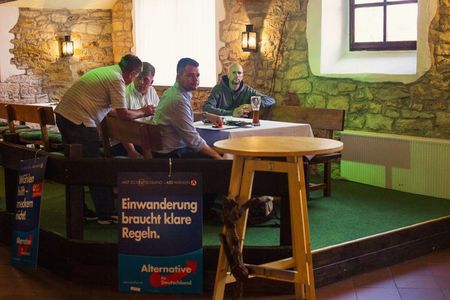German anti-euro party set for gains in eastern votes

By Stephen Brown
FREITAL Germany (Reuters) – The Alternative for Germany (AfD) looks set to win its first seats in a German state parliament as it evolves from a single-issue eurosceptic party into a law-and-order movement that could chip away at Chancellor Angela Merkel’s conservative hegemony.
Three eastern regions, still struggling to catch up with the richer west nearly 25 years after unification, hold elections in the coming weeks – Saxony on Aug. 31, Thuringia and Brandenburg on Sept. 14. The AfD has a chance of winning seats in all three.
Not yet two-years-old, the party won entry into the European Parliament in May and is now on the brink of establishing itself as a force in domestic politics, despite attempts by Merkel’s Christian Democrats (CDU) to demonise it as a fringe movement that flirts with the far-right.
“In Germany that’s the killer argument – when you want to silence someone, all you have to do is call them far-right or populist,” said Frauke Petry, the 39-year-old businesswoman who is spearheading the AfD’s campaign in Saxony.
Voters in Saxony, nestled in an eastern corner of Germany, next to Poland and the Czech Republic, have been unsettled by cross-border theft of agricultural equipment and trafficking in the drug crystal methamphetamine.
Along with education, boosting the state police force has emerged as one of the hottest campaign issues, and one the AfD has been quick to exploit.
Merkel’s CDU has ruled Saxony ever since unification in 1990 and its hold on power there is not at risk in the vote. Polls put support for the party on 40-42 percent, double that of the next closest party, the far-left “Linke”.
But CDU state premier Stanislaw Tillich is likely to need a coalition partner to keep his job and chances are slim that he can rely on his current partner, the sliding Free Democrats (FDP), again.
The most likely scenario is that he teams up with the centre-left Social Democrats (SPD), mirroring Merkel’s “grand coalition” in Berlin. But that has not stopped speculation that the CDU may be tempted to link up with the AfD, forcing the chancellor herself to counter that talk over the weekend.
“For us the AfD is not a possible coalition partner,” Merkel told public broadcaster ARD on Sunday.
Regardless, if the AfD makes it into the state parliament in Saxony and the other eastern states, it could start a broader debate within the CDU about future cooperation.
LEFT-LED GOVERNMENT
In contrast to Saxony, Merkel’s party faces a legitimate risk of being booted out of office in Thuringia, even though polls put them in the lead. In what would be a first at state level, the far-left Linke, or Left party, could end up seizing control of the government there with the SPD as junior partners.
That result would fuel speculation that the SPD may consider breaking its taboo on teaming up with the Left at the federal level in 2017, in the hopes of ejecting Merkel and her CDU from power. In the third state, Brandenburg, the SPD is expected to keep power in partnership with the Left.
Back in Saxony, AfD candidate Petry spoke to about 50 supporters in Freital, a coal and steel town near the state capital Dresden. Being frank on issues like crime, immigration or discipline in schools “puts you on the right of the CDU, whether you like it or not”, she said.
She estimates that one in 10 AfD members has joined from Merkel’s party. One of these defectors is Hartmut Roth, a lawyer in a purple bow tie who has switched allegiance after 36 years in the CDU.
“When I joined the CDU I was a wild young thing, but by the time I left I was on the conservative wing, because the party had moved from right to left around me,” he said in Freital.
Saxony, Thuringia and Brandenburg are among the country’s poorest regions, along with the other former German Democratic Republic (GDR) states Saxony-Anhalt and Mecklenburg-Vorpommern.
Some areas, especially the business hubs around Dresden and Leipzig in Saxony, buck the trend and Tillich is praised, even by people who do not intend to vote for him, for spending on infrastructure that attracts investment and jobs.
Roland Woeller, who represents Freital for the CDU in the Saxony state assembly, says there has been economic progress in the state but that people now compare their lot to friends in booming western cities like Duesseldorf, Stuttgart or Munich.
“The gap between east and west has been reduced but the gap remains,” he said.
(Additional reporting by Hans-Edzard Busemann and Reuters Television; Editing by Noah Barkin and Angus MacSwan)